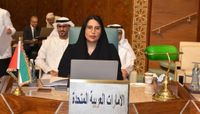The 163rd session of the Council of the League of Arab States commenced on April 22, 2025, in Cairo, focusing on pressing issues facing the Arab world. The session, led by Jordan, gathered permanent delegates from various member states, including Kuwait and the United Arab Emirates, to discuss a broad agenda that encompasses political, economic, and social matters.
During the opening remarks, Ambassador Amjad Al-Adhaileh, the Jordanian representative, emphasized the challenging circumstances the Arab nation currently faces. He stated, "The Arab nation is at a stage of intersection and a dangerous environment, perhaps more dangerous and more accurate than what it faced since decades, with challenges increasing and ambitions escalating." This sentiment reflects a growing concern among Arab leaders about the multifaceted crises affecting the region.
Al-Adhaileh highlighted the Palestinian issue as a central concern, asserting that it remains the core of regional conflict. He remarked, "The Palestinian issue remains at the forefront of the conflict, which is being subjected to all ambitions, and its just and comprehensive demands remain a navigation for all who want the region's affairs and the affairs of its countries to be free from them except by resolving the Palestinian issue in a just and comprehensive manner that ends the occupation and restores rights to its owners." This underscores the ongoing struggle for Palestinian rights and the impact it has on regional stability.
In light of the continuous violence and instability affecting Palestinians in the West Bank and Gaza, Al-Adhaileh reiterated the necessity for peace. He stated, "It is not possible to reach a world more peaceful than if the Palestinians obtain their legitimate rights," further emphasizing the urgency for diplomatic efforts to halt the ongoing conflict.
The agenda for the session includes nine principal items, with a focus on joint Arab action. It features a report from the Secretary-General of the League of Arab States detailing developments since the last session, as well as preparations for the upcoming 34th Arab Summit scheduled for May 17 in Baghdad.
Other critical topics on the agenda address the Palestinian issue, including updates on the political developments surrounding it and the ongoing Israeli violations in occupied Jerusalem. The delegates will also discuss support for the State of Palestine, Arab national security, and the issue of water security, particularly concerning Israel's appropriation of water resources in occupied territories.
In addition to the Palestinian issue, the session will tackle various regional challenges, including the situations in Libya, Yemen, Sudan, and Somalia. The delegates are expected to express solidarity with Lebanon and address the ongoing crises in Syria and the Iranian occupation of three Emirati islands. Furthermore, they will discuss the need for a unified Arab stance against Turkish incursions into Iraqi sovereignty.
On the international front, the agenda includes discussions on the dangers posed by Israeli armament to Arab national security and international peace. The delegates aim to establish a region free of weapons of mass destruction while enhancing cooperation in cybersecurity and information technology.
The UAE, represented by Ambassador Mariam Al-Kaabi, is also actively participating in this session, highlighting its commitment to joint Arab efforts. The agenda reflects a comprehensive approach to addressing both immediate and long-term challenges facing the region, including climate issues and the legal frameworks necessary for preserving Arab national security.
As the session progresses, the permanent delegates are expected to raise draft resolutions and decisions related to these agenda items during the ministerial session scheduled for April 23, 2025. This session will see Arab foreign ministers convening to finalize and adopt the proposed measures.
Through collaborative efforts under the Arab League, member states are working to strengthen political solutions to the crises facing the Arab world. Al-Adhaileh concluded by stating, "Under the umbrella of the Arab League, we will continue to play a role in strengthening political solutions to ambitions facing Arab countries, and we aim to support their security and stability and reject foreign interference in their affairs and sovereignty and enable and strengthen national state institutions." This commitment to unity and cooperation is crucial for navigating the complex landscape of regional politics.
In summary, the 163rd session of the League of Arab States represents a critical moment for Arab countries to address their collective challenges, particularly the ongoing Palestinian struggle, and to foster cooperation among member states to enhance regional stability and security.





